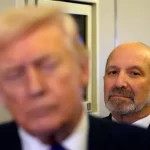
Authored by Jeffrey Tucker via The Brownstone Institute,
It’s coming up in a fortnight. For many people, all their hopes rest on the outcome. I get it because these seem like very dark times. We cannot live without hope. But we also need realism. The problems are deep, pervasive, scandalously entrenched.
Many people won financially and in terms of power from lockdowns and have no intention either to apologize or give up their gains. What’s more, for that to have happened to this great country – and many great counties – indicates something far more pernicious than a policy error or an ideological mistake.
The fix is going to require vast change. Tragically, the elected politicians may be the least likely to push for such a change. This is due to what we call the “Deep State” but there ought to be another name. It is rather obvious now that we are dealing with a beast that includes media, technology, nonprofits, and multinational and international government agencies and all the groups they represent.
That said, let’s deal here with the most obvious problem: the administrative state.
The plot of every episode of Yes, Minister – a British sitcom that aired in the early 1980s – is pretty much the same. The appointed Minister of the Department of Administrative Affairs waltzes in with a grand and idealistic statement left over from his political campaigns. The permanent secretary who serves him responds affirmatively and then cautions that there might be other considerations to take into account.
The rest follows like clockwork. The other considerations unfold as inevitable or manufactured behind the scenes. For reasons mostly having to do with career concerns – staying out of trouble, advancing through the ranks or avoiding fall down them, pleasing some special interest, obeying the Prime Minister whom we never see, or coming across well in the media – he backs down and reverses his view. It ends as it begins: the permanent secretary gets his way.
The lesson one gains from this hilarious series is that the elected politicians are outnumbered and outwitted on all sides, only pretending to be in charge when in fact the actual affairs of state are managed by experienced professionals with permanent positions. They all know each other. They have mastered the game. They have all the institutional knowledge.
The politicians, on the other hand, are skilled at what they actually do, which is win elections and advance their careers. Their supposed principles are just the veneer put on to please the public.
What makes the series especially painful is that viewers can’t help but put themselves in the position of the Minister of the Department of Administrative Affairs. How would we have done things differently? And if we had, would we have survived? Those are hard questions because the answer is not obvious at all. It seems like the fix is in.
Now, to be sure, in this series all of the players have elements of charm. We laugh at the bureaucracy and their ways. We are delighted by the oddly emerging lack of scruples by the politician. In the end, however, the system seems to work more or less. Maybe this is just how things are supposed to be. It was ever thus and must always be.
Anyone can be forgiven for believing that just a few years ago. But then the last three years happened. The rule by the administrative bureaucracy in every country became highly personal when our churches were closed, the businesses were shut down, we could not travel, we could not go to gyms or theaters, and then they came after every arm insisting that we accept a shot we did not want and most people did not need.
The laughter of the sort Yes, Minister inspired is over. There is far more at stake. But just as the stakes are high, so too the problem of implementing a solution – representative democracy as a means to reobtain liberty itself – is also exceedingly difficult.
All new politicians come in with ideals, just like the Minister in the show. In a matter of weeks, days, or even hours, they are confronted with reality. They need a staff, an experienced staff. Otherwise, they cannot even begin to manage the legislative process or participate in it. They have a massive schedule to keep and this becomes their job rather than enacting change.
Indeed, the entire system seems rigged against change. It starts with the permanent staff on Capitol Hill. It’s a tribe. They move from office to office. They all know each other and also the permanent staff of the bureaucracies who serve the Congress, and they in turn have close relations with the permanent staff of the executive bureaucracies, who in turn have close relationships with the media and the corporate executives lobbying the Congressperson. The naive people, no matter how well intended, are quickly surrounded.
This is essentially what happened to Trump. He figured that as president, he would be like a CEO, not just of all of government but the whole country. Within months, he was shown otherwise. A few months later, he pretty much gave up dealing with Congress. The bureaucracy was off limits. He was being hammered constantly by the media. This is why he very soon resorted to executive orders and the trade power: here he could actually have influence.
It’s shocking that no one seemed to have prepared him for the job. It is always this way, and by intention. It will be this way for all the new Republicans who take office in January 2023 at all levels of government. They will arrive completely unprepared for the task and already set up to fail even at the things they aspire to do that might otherwise be good. It will be a massive uphill climb even as they are being savaged by the media and taught the ways of government by the permanent staff at all levels.
I’m unaware of any training program that alerts them to the dangers they will face if they really seek change. And even if they are aware, it’s not clear what they can do.
This is precisely why there needs to be a focus as never before on the problem of the administrative state. It has to be penetrated and taken apart piece by piece. That will involve not only constant investigations but also courageous bills that seek not cuts but full-on defunding of whole agencies one after another. That’s what it will require to make genuine change.
What’s more, there might only be one chance to do this before it is truly too late. My current read on the situation is that the GOP is not ready for the job. Recall that there was a red wave in 1994 too and essentially nothing good came of it. It was a massive and devastating disappointment.
That cannot be allowed to happen again. In the end, what’s more powerful than political changes and even election upheavals, which too often fail through subversion, are dramatic shifts in public opinion. Every institution ultimately bends to that, which is why research, education, great journalism, and competent media outlets, plus friendship networks and community organizing, might actually be more foundational than elections. All of this has begun and it is growing. Therein lies the real hope.
Otherwise, the red wave might end up as nothing more than another episode of Yes, Minister.
Authored by Jeffrey Tucker via The Brownstone Institute,
It’s coming up in a fortnight. For many people, all their hopes rest on the outcome. I get it because these seem like very dark times. We cannot live without hope. But we also need realism. The problems are deep, pervasive, scandalously entrenched.
Many people won financially and in terms of power from lockdowns and have no intention either to apologize or give up their gains. What’s more, for that to have happened to this great country – and many great counties – indicates something far more pernicious than a policy error or an ideological mistake.
The fix is going to require vast change. Tragically, the elected politicians may be the least likely to push for such a change. This is due to what we call the “Deep State” but there ought to be another name. It is rather obvious now that we are dealing with a beast that includes media, technology, nonprofits, and multinational and international government agencies and all the groups they represent.
That said, let’s deal here with the most obvious problem: the administrative state.
The plot of every episode of Yes, Minister – a British sitcom that aired in the early 1980s – is pretty much the same. The appointed Minister of the Department of Administrative Affairs waltzes in with a grand and idealistic statement left over from his political campaigns. The permanent secretary who serves him responds affirmatively and then cautions that there might be other considerations to take into account.
The rest follows like clockwork. The other considerations unfold as inevitable or manufactured behind the scenes. For reasons mostly having to do with career concerns – staying out of trouble, advancing through the ranks or avoiding fall down them, pleasing some special interest, obeying the Prime Minister whom we never see, or coming across well in the media – he backs down and reverses his view. It ends as it begins: the permanent secretary gets his way.
The lesson one gains from this hilarious series is that the elected politicians are outnumbered and outwitted on all sides, only pretending to be in charge when in fact the actual affairs of state are managed by experienced professionals with permanent positions. They all know each other. They have mastered the game. They have all the institutional knowledge.
The politicians, on the other hand, are skilled at what they actually do, which is win elections and advance their careers. Their supposed principles are just the veneer put on to please the public.
What makes the series especially painful is that viewers can’t help but put themselves in the position of the Minister of the Department of Administrative Affairs. How would we have done things differently? And if we had, would we have survived? Those are hard questions because the answer is not obvious at all. It seems like the fix is in.
Now, to be sure, in this series all of the players have elements of charm. We laugh at the bureaucracy and their ways. We are delighted by the oddly emerging lack of scruples by the politician. In the end, however, the system seems to work more or less. Maybe this is just how things are supposed to be. It was ever thus and must always be.
Anyone can be forgiven for believing that just a few years ago. But then the last three years happened. The rule by the administrative bureaucracy in every country became highly personal when our churches were closed, the businesses were shut down, we could not travel, we could not go to gyms or theaters, and then they came after every arm insisting that we accept a shot we did not want and most people did not need.
The laughter of the sort Yes, Minister inspired is over. There is far more at stake. But just as the stakes are high, so too the problem of implementing a solution – representative democracy as a means to reobtain liberty itself – is also exceedingly difficult.
All new politicians come in with ideals, just like the Minister in the show. In a matter of weeks, days, or even hours, they are confronted with reality. They need a staff, an experienced staff. Otherwise, they cannot even begin to manage the legislative process or participate in it. They have a massive schedule to keep and this becomes their job rather than enacting change.
Indeed, the entire system seems rigged against change. It starts with the permanent staff on Capitol Hill. It’s a tribe. They move from office to office. They all know each other and also the permanent staff of the bureaucracies who serve the Congress, and they in turn have close relations with the permanent staff of the executive bureaucracies, who in turn have close relationships with the media and the corporate executives lobbying the Congressperson. The naive people, no matter how well intended, are quickly surrounded.
This is essentially what happened to Trump. He figured that as president, he would be like a CEO, not just of all of government but the whole country. Within months, he was shown otherwise. A few months later, he pretty much gave up dealing with Congress. The bureaucracy was off limits. He was being hammered constantly by the media. This is why he very soon resorted to executive orders and the trade power: here he could actually have influence.
It’s shocking that no one seemed to have prepared him for the job. It is always this way, and by intention. It will be this way for all the new Republicans who take office in January 2023 at all levels of government. They will arrive completely unprepared for the task and already set up to fail even at the things they aspire to do that might otherwise be good. It will be a massive uphill climb even as they are being savaged by the media and taught the ways of government by the permanent staff at all levels.
I’m unaware of any training program that alerts them to the dangers they will face if they really seek change. And even if they are aware, it’s not clear what they can do.
This is precisely why there needs to be a focus as never before on the problem of the administrative state. It has to be penetrated and taken apart piece by piece. That will involve not only constant investigations but also courageous bills that seek not cuts but full-on defunding of whole agencies one after another. That’s what it will require to make genuine change.
What’s more, there might only be one chance to do this before it is truly too late. My current read on the situation is that the GOP is not ready for the job. Recall that there was a red wave in 1994 too and essentially nothing good came of it. It was a massive and devastating disappointment.
That cannot be allowed to happen again. In the end, what’s more powerful than political changes and even election upheavals, which too often fail through subversion, are dramatic shifts in public opinion. Every institution ultimately bends to that, which is why research, education, great journalism, and competent media outlets, plus friendship networks and community organizing, might actually be more foundational than elections. All of this has begun and it is growing. Therein lies the real hope.
Otherwise, the red wave might end up as nothing more than another episode of Yes, Minister.







